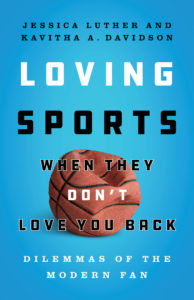You’re Paying for Sports Stadiums You Don’t Even Go To, write Jessica Luther and Kavitha A. Davidson in an excerpt from their new book Loving Sports When They Don’t Love You Back: Dilemmas of the Modern Fan, published 8/31/20 on Literary Hub:
Welcome to your shiny new stadium, which may or may not have been necessary to build but almost certainly was built unnecessarily with local tax dollars. This is the world of stadium subsidies, where suckers pay for billionaire owners to construct new dollhouses for their plaything sports teams so that they can pocket revenues from increased ticket prices, more luxury suites, high-end food options, and $15 beers. It’s a world where the ever-loyal fan overlooks a grand compromise made in exchange for the local team simply staying put.
One of the greatest American hustles is how a populace taught that we’re built on the ideals of freedom, democracy, and capitalism manages to willingly forego those ideals in the name of sports.So why do we allow federal/state tax breaks and subsidies, which fall on all citizens, for sports but not other forms of entertainment?
The authors, not surprisingly, trace it back to the 1950s, when East Coast teams moving to the midwest and west were able to extract subsidies from cities aiming to be "big league"--including, of course, the Brooklyn-to-Los Angeles Dodgers.
Thhe explanation:
Thhe explanation:
“The non-economic reason is this: The fans cannot live without these teams,” according to David Berri, an economics professor at Southern Utah University who specializes in sports economics. “I’m not a psychologist, but it seems to me like sports, politics, and religion all activate the same parts of the brain,” he surmises. “For a lot of people, this is their whole identity. It’s this external thing where I belong to something that’s bigger than me and it gives me my identity. And so for a lot of sports fans, their sports team is who they are. So if you take away their sports team, you literally take away their person.”And that's exploited by teams and leagues, even as the reality--the likelihood of Madison Square Garden leaving New York City--seems ever distant, which should prompt a re-think.

Comments
Post a Comment